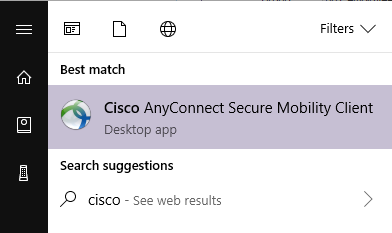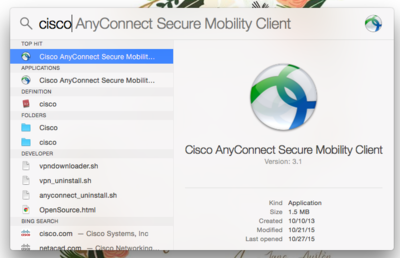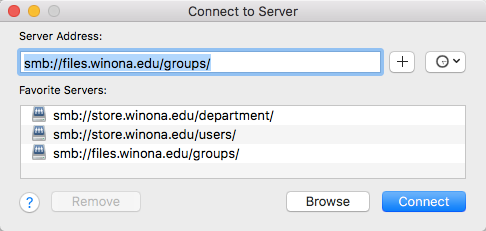VPN for Students
Jump to navigation
Jump to search
(Looking for the VPN for Employees page?)
How do I connect to the student VPN?
VPN will not work on the Winona State campus networks: warrior, WAZOO, and WSU Guest. You do not need the vpn network if you are on campus and can connect to these networks. This network does not provide you with a wireless network, you need to be connect to a wireless network to use.
Windows
These instructions are for WSU laptops.
- Open the start menu and type Cisco.
- Select 'Cisco AnyConnect Secure Mobility Client' when it appears.
- If it does not appear, as shown below, contact Tech Support or refer to the section below regarding personal computers.
- Make sure you are connecting to wsutunnel.winona.edu and select Connect on the Cisco AnyConnect Secure Mobility client.
(if you see tunnel.winona.edu, add wsu in front of tunnel)
- The vpn will use your Microsoft credentials, e.g. students will log in with their starid followed by @go.minnstate.edu (ab1234cd@go.minnstate.edu) and employees will log in with their starid followed by @minnstate.edu (ab1234cd@minnstate.edu).
- Note: the first time you connect AnyConnect will run updates and ask you to restart your machine, be sure to save our documents before restarting.
- After the restart, connect again and it will auto connect to the network.
- To confirm the computer is connected to the vpn network, the AnyConnect icon will display on the system tray icons, located on the lower right corner by the date and time. You may have to click on the arrow.
- To disconnect, click on the AnyConnect icon on the system tray and choose Disconnect.
macOS
- On your WSU leased laptop, if you have not used the Cisco AnyConnect Secure Mobility client before, you will need to install the client from the Manage Software Center on your mac.
- Once install, click on Spotlight icon (magnify glass) in the upper right corner on the menu bar.
- Type "Cisco" and Select "Cisco AnyConnect Secure Mobility Client"
- Connect to wsutunnel.winona.edu (if you see tunnel.winona.edu, add WSU in front of tunnel), click Connect and you will be redirected to a Microsoft Sign in page.
- The vpn will use your Microsoft credentials, e.g. students will log in with their starid followed by @go.minnstate.edu (ab1234cd@go.minnstate.edu) and employees will log in with their starid followed by @minnstate.edu (ab1234cd@minnstate.edu) and your starid password.
- The first time you use it, it will install updates.
- To confirm the computer is connected to the vpn network, the Cisco AnyConnect icon will be located on the menu bar in the upper right corner, next to the date and time. The icon will appear with a "small lock" over the icon when the computer is connected to the vpn network.
- To disconnect, click on the AnyConnect icon on the menu bar and choose Disconnect. If you don't want the Cisco AnyConnect icon to appear on the menu bar, choose Quit Cisco AnyConnect.
Personal Computers
Students with personal computers can access VPN but will need to install the Cisco AnyConnect Secure Mobility Client.
- To install, open an internet browser and go to https://wsutunnel.winona.edu. This page only works off-campus. If you are on-campus, come to Tech Support in Somsen 207 to install it.
How do I access my network storage?
If you want to connect to personal network or department network drives from off-campus, you will first need to connect to VPN.
Windows 10
- Open your Start Menu and click the "Click to Map Network Drives" tile located at the top middle of the screen. Then wait for the command prompt window to close by itself.
- Re-open your Start Menu and click the "File Explorer" tile in the middle of the screen
- Your network storage drives will be located under the "Network locations" heading. You may have to scroll down to find it.
Windows 11
- Search your laptop for "Click to Map Network Drives" and select it. This will open a Command prompt window, wait for the window to close by itself.
- Open your file explorer. If you don't have this pin to your start menu or your taskbar, search your computer for "file explorer"
- Your network storage drives will be located under "This PC" and under the "Network locations" heading.
macOS
- In Finder, press and hold the <Command> key then tap the <K> key to bring up the "Connect to Server" prompt
- Connect to one of the network locations listed in Fig 2.
- Just copy/paste one of the addresses below if your list is not pre-populated
- Class storage: smb://files.winona.edu/classes
- To see a list of available network storage: smb://files.winona.edu




